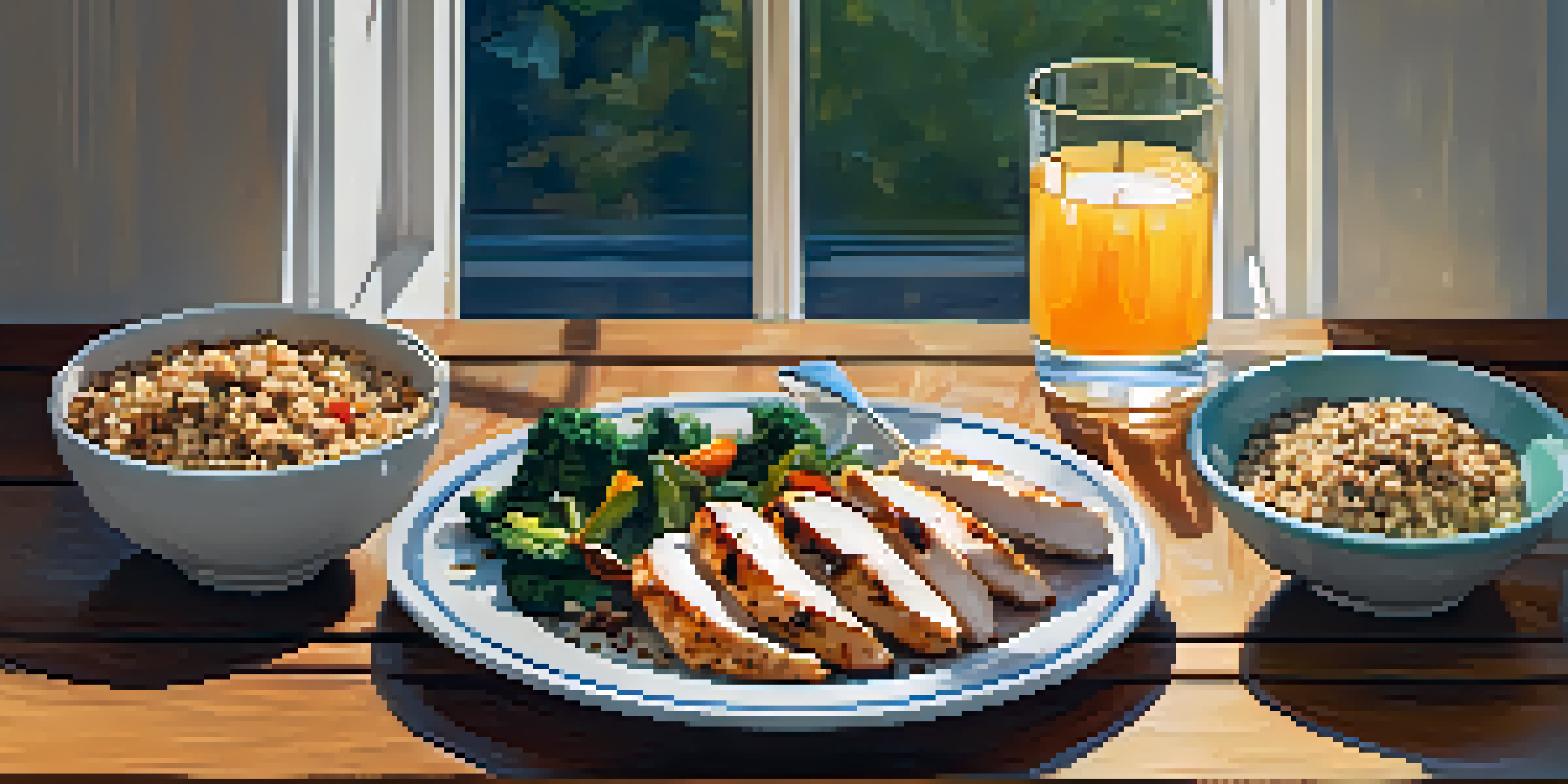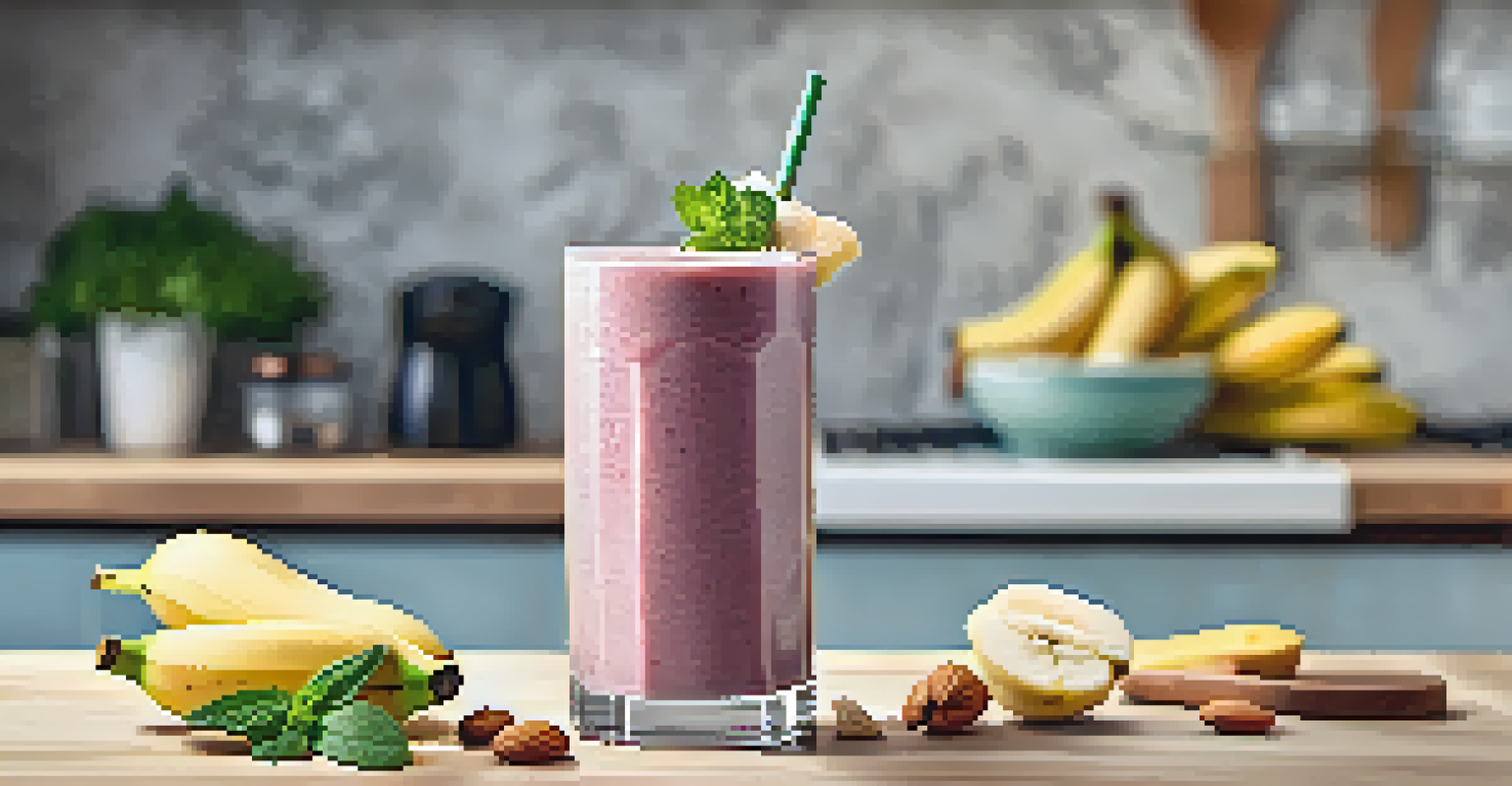Top Nutritional Practices for Post-Powerlifting Recovery

Understanding the Importance of Recovery Nutrition
After a grueling powerlifting session, your muscles aren't just tired; they are in need of repair and nourishment. Recovery nutrition plays a crucial role in helping your body heal and rebuild. It’s not just about what you eat; it’s about when and how much you consume to optimize your recovery.
Take care of your body. It's the only place you have to live.
Think of your body as a high-performance machine that needs the right fuel to keep running smoothly. Consuming the right nutrients post-workout can significantly reduce muscle soreness and improve your overall performance in future lifts. Ignoring recovery nutrition can lead to prolonged fatigue and hinder your progress.
Incorporating a balanced intake of carbohydrates, proteins, and fats right after your training can make a world of difference. Your body is primed to absorb these nutrients, making it an ideal time to replenish and refuel.
The Role of Protein in Muscle Recovery
Protein is often dubbed the building block of muscle, and for good reason. After lifting heavy weights, your muscles experience micro-tears, and protein helps repair these damages. Incorporating a source of protein into your post-workout meal can kickstart this recovery process.

Aim for about 20-30 grams of high-quality protein within 30 minutes of finishing your workout. Foods like chicken, fish, or plant-based options like lentils are excellent choices. This protein intake helps stimulate muscle protein synthesis, ensuring your muscles recover stronger.
Fuel Your Recovery Right After Workouts
Consuming a balanced meal with protein and carbs within 30 minutes to two hours post-workout is essential to optimize muscle recovery.
Beyond just muscle repair, protein also plays a vital role in immune function and overall health. By prioritizing protein in your recovery, you're not just aiding your lifts but also supporting your body's resilience.
Carbohydrates: The Energy Source You Need
While protein is essential for muscle repair, carbohydrates are equally important for restoring your energy levels. During powerlifting, glycogen stores get depleted, making it crucial to replenish them after your workout. Carbs serve as a quick source of energy, helping you bounce back for your next training session.
Nutrition is not just about eating, it's about learning to live.
Incorporating complex carbohydrates like quinoa, sweet potatoes, or whole grain pasta can provide sustained energy and aid in recovery. Pairing these with your protein sources can create a balanced post-workout meal that promotes optimal recovery.
Remember, the timing of your carbohydrate intake is key. Consuming carbs within the post-workout window can enhance glycogen replenishment, ensuring you're ready for your next lift.
Hydration: Don't Overlook This Essential Element
Hydration is often the unsung hero of recovery nutrition. During intense powerlifting sessions, you lose fluids through sweat, and rehydrating is crucial for optimal recovery. Water plays a critical role in nutrient transportation, muscle function, and overall bodily performance.
After your workout, aim to drink at least 16-24 ounces of water to replenish lost fluids. It’s also beneficial to include electrolyte-rich drinks, especially if your session was particularly sweaty. Electrolytes help restore balance and support muscle function.
Hydration Is Key for Optimal Recovery
Rehydrating with water and electrolytes after intense workouts is crucial for nutrient transport and overall bodily performance.
Keep in mind that hydration doesn’t stop after your workout. Continuing to drink water throughout the day ensures your body remains in peak condition, ready for the next challenge.
Incorporating Healthy Fats into Your Diet
Healthy fats are essential not just for energy but also for supporting cellular health and hormone production. While many focus on protein and carbs, fats are important for a well-rounded recovery diet. Foods like avocados, nuts, and olive oil can serve as excellent fat sources post-workout.
These fats can help reduce inflammation and promote recovery by supporting your body’s repair processes. Additionally, they help maintain your overall energy levels, ensuring you’re not left feeling drained after intense workouts.
Striking the right balance of healthy fats in your diet can enhance your recovery, making it easier to return to the gym feeling ready to tackle your next lift.
Timing Your Meals for Optimal Recovery
The timing of your meals can greatly impact your recovery process. Consuming a balanced meal or snack within 30 minutes to two hours after your workout is often referred to as the 'anabolic window.' This period is when your muscles are most receptive to nutrients, making it crucial to take advantage of it.
Plan your meals around your training schedule to ensure you’re getting the right nutrients when your body needs them most. If you’re unable to have a full meal right after your workout, consider a protein shake or a snack that combines carbs and protein.
Consistency Enhances Recovery Results
Establishing a routine for recovery nutrition helps your body adapt and respond positively over time, leading to better performance.
By being mindful of your nutrition timing, you can significantly enhance your recovery and performance in future workouts, helping you achieve your powerlifting goals more efficiently.
Listening to Your Body: Individual Needs Matter
Every athlete is different, and what works for one person might not work for another. Listening to your body is key when it comes to nutrition and recovery. Pay attention to how different foods make you feel and adjust your intake accordingly.
Consider keeping a food journal to track what you eat and how you feel during your workouts. This can help identify patterns and guide you toward the best nutritional practices for your unique needs and preferences.

Ultimately, customizing your recovery nutrition based on your personal experiences will lead to better outcomes. The more in tune you are with your body, the more effectively you can recover and perform.
The Importance of Consistency in Recovery Nutrition
Like any aspect of training, consistency is vital when it comes to recovery nutrition. It’s not just about what you do after one workout but what you do regularly that counts. Establishing a routine will help your body adapt and respond positively over time.
Make it a habit to plan your post-workout meals and snacks ahead of time. This way, you won’t be left scrambling for food when you’re most hungry and fatigued. Preparation can be the difference between a nutritious recovery meal and a quick, unhealthy snack.
By prioritizing consistency in your nutritional practices, you'll maximize your recovery efforts and set yourself up for success in your powerlifting journey.